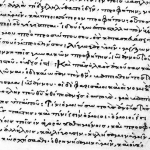In the days of King Herod of Judea, there was a priest named Zechariah, who belonged to the priestly order of Abijah. His wife was a descendant of Aaron, and her name was Elizabeth. Both of them were righteous before God, living blamelessly according to all the commandments and regulations of the Lord. But they had no children, because Elizabeth was barren, and both were getting on in years.
Once when he was serving as priest before God and his section was on duty, he was chosen by lot, according to the custom of the priesthood, to enter the sanctuary of the Lord and offer incense. Now at the time of the incense offering, the whole assembly of the people was praying outside. Then there appeared to him an angel of the Lord, standing at the right side of the altar of incense. When Zechariah saw him, he was terrified; and fear overwhelmed him. But the angel said to him, “Do not be afraid, Zechariah, for your prayer has been heard. Your wife Elizabeth will bear you a son, and you will name him John. You will have joy and gladness, and many will rejoice at his birth, for he will be great in the sight of the Lord. He must never drink wine or strong drink; even before his birth he will be filled with the Holy Spirit. He will turn many of the people of Israel to the Lord their God. With the spirit and power of Elijah he will go before him, to turn the hearts of parents to their children, and the disobedient to the wisdom of the righteous, to make ready a people prepared for the Lord.” Zechariah said to the angel, “How will I know that this is so? For I am an old man, and my wife is getting on in years.” The angel replied, “I am Gabriel. I stand in the presence of God, and I have been sent to speak to you and to bring you this good news. But now, because you did not believe my words, which will be fulfilled in their time, you will become mute, unable to speak, until the day these things occur.”
Meanwhile the people were waiting for Zechariah, and wondered at his delay in the sanctuary. When he did come out, he could not speak to them, and they realized that he had seen a vision in the sanctuary. He kept motioning to them and remained unable to speak. When his time of service was ended, he went to his home.
After those days his wife Elizabeth conceived, and for five months she remained in seclusion. She said, “This is what the Lord has done for me when he looked favorably on me and took away the disgrace I have endured among my people.” And she said,
“My soul magnifies the Lord,
and my spirit rejoices in God my Savior,
for he has looked with favor on the lowliness of his servant.
Surely, from now on all generations will call me blessed;
for the Mighty One has done great things for me,
and holy is his name.
His mercy is for those who fear him
from generation to generation.
He has shown strength with his arm;
he has scattered the proud in the thoughts of their hearts.
He has brought down the powerful from their thrones,
and lifted up the lowly;
he has filled the hungry with good things,
and sent the rich away empty.
He has helped his servant Israel,
in remembrance of his mercy,
according to the promise he made to our ancestors,
to Abraham and to his descendants forever.”
Now the time came for Elizabeth to give birth, and she bore a son. Her neighbors and relatives heard that the Lord had shown his great mercy to her, and they rejoiced with her.
On the eighth day they came to circumcise the child, and they were going to name him Zechariah after his father. But his mother said, “No; he is to be called John.” They said to her, “None of your relatives has this name.” Then they began motioning to his father to find out what name he wanted to give him. He asked for a writing tablet and wrote, “His name is John.” And all of them were amazed. Immediately his mouth was opened and his tongue freed, and he began to speak, praising God. Fear came over all their neighbors, and all these things were talked about throughout the entire hill country of Judea. All who heard them pondered them and said, “What then will this child become?” For, indeed, the hand of the Lord was with him.
Then his father Zechariah was filled with the Holy Spirit and spoke this prophecy:
“Blessed be the Lord God of Israel,
for he has looked favorably on his people and redeemed them.
He has raised up a mighty savior for us
in the house of his servant David,
as he spoke through the mouth of his holy prophets from of old,
that we would be saved from our enemies and from the hand of all who hate us.
Thus he has shown the mercy promised to our ancestors,
and has remembered his holy covenant,
the oath that he swore to our ancestor Abraham,
to grant us that we, being rescued from the hands of our enemies,
might serve him without fear, in holiness and righteousness
before him all our days.
And you, child, will be called the prophet of the Most High;
for you will go before the Lord to prepare his ways,
to give knowledge of salvation to his people
by the forgiveness of their sins.
By the tender mercy of our God,
the dawn from on high will break upon us,
to give light to those who sit in darkness and in the shadow of death,
to guide our feet into the way of peace.”
When the time came for their purification according to the law of Moses, they brought him up to Jerusalem to present him to the Lord (as it is written in the law of the Lord, “Every firstborn male shall be designated as holy to the Lord”), and they offered a sacrifice according to what is stated in the law of the Lord, “a pair of turtledoves or two young pigeons.”
Now there was a man in Jerusalem whose name was Simeon; this man was righteous and devout, looking forward to the consolation of Israel, and the Holy Spirit rested on him. It had been revealed to him by the Holy Spirit that he would not see death before he had seen the Lord’s Messiah. Guided by the Spirit, Simeon came into the temple; and when the parents brought in the child to do for him what was customary under the law, Simeon took him in his arms and praised God, saying,
“Master, now you are dismissing your servant in peace,
according to your word;
for my eyes have seen your salvation,
which you have prepared in the presence of all peoples,
a light for revelation to the Gentiles
and for glory to your people Israel.”
And the child’s father and mother were amazed at what was being said about him. Then Simeon blessed them and said to his mother, “This child is destined for the falling and the rising of many in Israel, and to be a sign that will be opposed so that the inner thoughts of many will be revealed—and a sword will pierce your own soul too.”
There was also a prophet, Anna the daughter of Phanuel, of the tribe of Asher. She was of a great age, having lived with her husband seven years after her marriage, then as a widow to the age of eighty-four. She never left the temple but worshiped there with fasting and prayer night and day. At that moment she came, and began to praise God and to speak about the child to all who were looking for the redemption of Jerusalem.
When they had finished everything required by the law of the Lord, they returned [home]. The child grew and became strong, filled with wisdom; and the favor of God was upon him.
In the time of King Herod wise men from the East came to Jerusalem, asking, “Where is the child who has been born king of the Jews? For we observed his star at its rising, and have come to pay him homage.” When King Herod heard this, he was frightened, and all Jerusalem with him; and calling together all the chief priests and scribes of the people, he inquired of them where the Messiah was to be born. They told him, “In Bethlehem of Judea; for so it has been written by the prophet:
‘And you, Bethlehem, in the land of Judah,
are by no means least among the rulers of Judah;
for from you shall come a ruler
who is to shepherd my people Israel.’”
Then Herod secretly called for the wise men and learned from them the exact time when the star had appeared. Then he sent them to Bethlehem, saying, “Go and search diligently for the child; and when you have found him, bring me word so that I may also go and pay him homage.” When they had heard the king, they set out; and there, ahead of them, went the star that they had seen at its rising, until it stopped over the place where the child was. When they saw that the star had stopped, they were overwhelmed with joy. On entering the house, they saw the child with his mother; and they knelt down and paid him homage. Then, opening their treasure chests, they offered him gifts of gold, frankincense, and myrrh. And having been warned in a dream not to return to Herod, they left for their own country by another road.
When Herod saw that he had been tricked by the wise men, he was infuriated, and he sent and killed all the children in and around Bethlehem who were two years old or under, according to the time that he had learned from the wise men.
And Elizabeth, having heard that they were searching for John, took him and went up into the hill-country, and kept looking where to conceal him. And there was no place of concealment. And Elizabeth, groaning with a loud voice, says: O mountain of God, receive mother and child. And immediately the mountain was cleft, and received her. And a light shone about them, for an angel of the Lord was with them, watching over them.
And Herod searched for John, and sent officers to Zechariah, saying: “Where have you hidden your son?” Answering he said to them, “I am the servant of God in holy things, and I sit constantly in the temple of the Lord: I do not know where my son is.” The officers went away and reported all these things to Herod. Herod was enraged and said, “His son is destined to be king over Israel.” And he sent to him again, saying: “Tell the truth; where is your son? For you know that your life is in my hand.” Zechariah said, “If you shed my blood I am God’s martyr, for the Lord will receive my spirit, because you shed innocent blood at the vestibule of the temple of the Lord.” And Zechariah was murdered about daybreak.
But the sons of Israel did not know that he had been murdered. At the hour of the salutation the priests went away, and Zechariah did not come forth to meet them with a blessing according to his custom. The priests stood waiting for Zechariah to salute them at the prayer and to glorify the Most High. When he still delayed they were all afraid. One of them ventured to go in and he saw clotted blood beside the altar, and he heard a voice saying, “Zechariah has been murdered and his blood shall not be wiped up until his avenger come.” Hearing this he was afraid and went out and told it to the priests. They ventured in and saw what had happened. The fretwork of the temple made a wailing noise, and they rent their clothes from the top even to the bottom. And they did not find his body, but they found his blood turned into stone. And they were afraid, and went out and reported to the people that Zechariah had been murdered. And all the tribes of the people heard, and mourned, and lamented for him three days and three nights. And after the three days, the priests consulted as to whom they should put in his place; and the lot fell upon Simeon. For it was he who had been warned by the Holy Spirit that he should not see death until he should see the Christ in the flesh.
The child grew and became strong in spirit, and he was in the wilderness until the day he appeared publicly to Israel.
The above is drawn from the Gospel of Luke, the Gospel of Matthew, and the Infancy Gospel (or Protoevangelium) of James. There has been almost no editing. The main part of the text above consists of places where it is either explicitly about John, Elizabeth, and Zechariah, or only says “the child” and “his mother” or “his parents.” In a couple of places I included a section where it mentions Jesus or Mary, but as an addition to “the child” or “his mother” and thus the names can easily be viewed as an addition. I also moved one sentence. The amount of editing to this hypothetical source that the Gospel authors would have needed to undertake to produce what we find in the versions we now have is thus of a minimal sort that we know they did (and sometimes their editorial interventions in source material were far more extensive).
What is your impression of the above? I am still uncertain about many things. Did the source situate John and his family in Bethlehem, Nazareth, or both? Was the Magnificat originally on the lips of Elizabeth rather than Mary (as we indeed find explicitly said in some manuscripts of the Gospel of Luke)? Should I incorporate other details from the Mandaean Book of John? Did Simeon’s Nunc Dimittis also come from this source and apply originally to John? With respect to that question the answer seems likely to be yes, both because of the consistency of style with other parts of the narrative, and because of the mention of Simeon in the infancy material about John in the Protoevangelium. Otherwise his appearance is abrupt, out of nowhere. The puzzling mention of the magi seeing the child and his mother when they arrive makes sense when placed in the context of the details in the Protoevangelium. But whatever questions remain (I still have very many), I hope the above makes clear that in Luke and in the Infancy Gospel of James we have portions of a source or sources that held not merely a high but a royal messianic view of John.
For an earlier attempt at discerning a baptist infancy narrative behind these works see Hugh J. Schonfield, The lost “Book of the nativity of John” a study in Messianic folklore and Christian origins, with a new solution to the virgin-birth problem. Edinburgh: T&T Clark, 1929. The topic is long overdue to be reexamined, I hope you’ll agree. One of the things I’ll do as part of my research on John the Baptist is take a close look at the relevant sources in Greek to see whether the details of vocabulary and style provide hints as to whether we are dealing with one source or more than one.
The Gospel of Luke, and the hypothetical source Q, both begin with John the Baptist. The Gospel of Mark begins by saying the beginning of the good news of Jesus was John. Arguably even the Gospel of John begins with John the Baptist as far as named human characters are concerned. Even though the Logos appears first, John appears in the prologue before the Word becomes flesh. The prologue may thus represent one of the many ways early Christians sought to take a story that naturally focused on John, with Jesus as merely one part of that story, and recast it as a story focused on Jesus himself…













